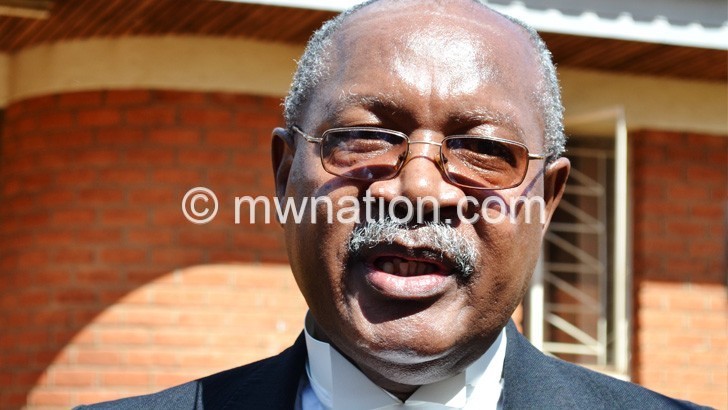Prosecutor details K2bn MDF cashgate
Special prosecutor Kamudoni Nyasulu has detailed how top Malawi Defence Force (MDF) and government officials “gifted” each other a share of the cake in what he alleges to be a dubious arms supply deal.
In a prosecution opening statement The Nation has seen dated June 6 2017 titled Chikomekome Chamkuyu Mkati Muli Mavu (nyerere), a vernacular Chinyanja equivalent for the English saying All That Glitters is Not Gold, Nyasulu has outlined how MDF, allegedly under then Army Commander Henry Odillo’s orders, paid about K2 billion to Thuso Group which it has transpired was neither a supplier nor a manufacturer of military ware.
The statement comes against the background of Odillo, his former deputy commander Clement Kafuwa, 63, former Accountant General David Kandoje, retired Lieutenant Colonel Nelson Kauwa Banda, 62, and Ganizani Kuchombo, 39, facing trial on eight counts in the High Court related to the deal.
According to Nyasulu’s statement, Odillo and the others allegedly conspired to defraud the State through what he describes as mkuyu (fig) contracts in a manner that appeared “deceptively legitimate and harmless at a glance, but dreadful in detail” through Thuso Group.

with deadly venom
In his conclusion, Nyasulu argues that if the equipment was sourced from Prime Take, a manufacturer and supplier of military equipment, MDF would have paid eight million pounds which is equivalent to 25 percent of the amount paid to Thuso Group on each lot of 5 000 blanks.
On the other hand, the special prosecutor’s statement said: “From the evidence, the Malawi Defence Force paid K9 700 000 on 13 March 2013, K920 000 000 on 20 August 2013 and ZAR [South African rand] 30 000 000 on 21 August 2013 to Thuso Group which is neither a manufacturer nor a supplier of military equipment when such equipment, if it had been supplied by Rheinmettal Denel Munition, a manufacturer and supplier of military equipment, would have cost the Malawi Defence Force ZAR6 798 750 which is about 23 percent of what was paid to Thuso Group on each lot of 5 000 blanks.”
Nyasulu, who is the only certified fraud examiner with a legal background among the country’s at least 15 mostly from the accounting profession, submits that in the absence of strategic and concerted civic education in Public Finance Management Framework, it is only the Judiciary’s “vigilant enforcement of provisions that criminalise the violation of the framework” that will make it effective and rescue Malawians from feeding on rotten mkuyu.
Details of the deal show that in 2011, MDF procured 88mm saluting blank cartridges from Prime Take based in the United Kingdom on June 30 that year and the company submitted an invoice to MDF for 1 000 units of cartridges at 88 euro a unit.
Prime Take’s delivery was accompanied by documentation, including conventional arms conveyance permit, conventional arms conveyance arms permit holder listing AB logistics as the holder; road manifest or air waybill of January 2 2012 with Lefa Engineering as consignor and MDF as consignee; Malawi Revenue Authority Asycuda Customs entry; a Prime Take invoice; and delivery note.
While this transaction was in progress, MDF opened negotiations with Rheinmettal Denel Munition to supply 5 000 and 10 000 88mm blank cartridges. This saw the supplier and manufacturer on May 15 2012 submitting an offer to supply on quotation reference number QM35195 at a unit price of $181.30 totalling $906 500.
This quotation was revised on July 2 2012 to cite currency in South African rand with the rate at ZAR1 359.75 totalling ZAR6 798 750, the statement adds.
Come December 3 2012, Odillo signed a ‘non-tranderable/end user certificate’ that the 5 000 units would be purchased solely for MDF.
In his statement, Nyasulu says: “This was the legitimate mkuyu skin and flesh that went into the records to be served to Malawians, but inside of the mkuyu contained something else. Inside of this mkuyu was filled with deadly venom!”
The evidence, Nyasulu states, will show that Thuso Group was neither a military equipment manufacturer nor a military equipment supplier.
He writes: “Alexander Kauwa Banda, Nelson Johannes Banda and Ganizani Sionga Kuchombo, trading as Thuso Group, entered into these mkuyu contracts with Malawi Defence Force whereupon Thuso Group submitted mkuyu supposed invoices to Malawi Defence Force and upon these sham invoices… The ammunition which was the subject of the contract was never delivered.”
Odillo and his four co-accused persons deny the charges and any wrongdoing. They are formally accused, among others, of conspiracy, improper payments, use of public office for personal advantage, dealing in contract, money laundering, gross negligence and influencing the use of public office for advantage.
The arms deal is part of the plunder of public resources at Capital Hill, widely known as Cashgate, exposed following the shooting of former Ministry of Finance budget director Paul Mphwiyo outside the gate of his Area 43 residence in Lilongwe on September 13 2013.
Former president Joyce Banda, who ascended to the presidency on April 7 2012 in line with constitutional order following the death of Bingu wa Mutharika, ordered a forensic audit which British firm Baker Tilly undertook between April and September 2013. The audit established that about K24 billion was siphoned from public coffers through dubious payments, inflated invoices and goods or services never rendered. MDF was named as one of the Cashgate conduits.
In 2015, a financial analysis report by audit and business advisory firm PricewaterhouseCoopers (PwC) also established that about K577 billion in public funds could not be reconciliated between 2009 and December 31 2014. The K577 billion figure was later revised downwards to K230 billion in another forensic audit released in 2016. n





